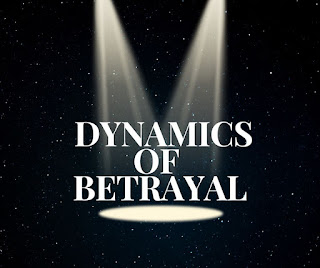Why is Forgiving Difficult?
Revenge is sweet
At a human level why do we seem to enjoy holding on to grudges and seeking to take revenge? Does revenge really feel sweet? In 2004 researchers at the University of Zürich demonstrated that punishing rule-breakers for unfair behavior or violating social norms activates a pleasure center of the brain related to satisfaction. (Brian Knutson “Sweet Revenge?” Science 27 August 2004) This lead to a series of popular news reports that the old adage “revenge is sweet” is scientifically proven.
Revenge may create initial feelings of pleasure or satisfaction, but more sophisticated research indicated that this was only so if the revenge was able to send a message to the offender.
At a human level why do we seem to enjoy holding on to grudges and seeking to take revenge? Does revenge really feel sweet? In 2004 researchers at the University of Zürich demonstrated that punishing rule-breakers for unfair behavior or violating social norms activates a pleasure center of the brain related to satisfaction. (Brian Knutson “Sweet Revenge?” Science 27 August 2004) This lead to a series of popular news reports that the old adage “revenge is sweet” is scientifically proven.
Revenge may create initial feelings of pleasure or satisfaction, but more sophisticated research indicated that this was only so if the revenge was able to send a message to the offender.
A simple example might be beeping your horn at an inconsiderate driver. Following up on more recent studies in 2011, Eric Jaffe warned that, “Behavioral scientists have observed that instead of quenching hostility, revenge can prolong the unpleasantness of the original offense and that merely bringing harm upon an offender is not enough to satisfy a person’s vengeful spirit. They have also found that instead of delivering justice, revenge often creates only a cycle of retaliation . . .” (“The Complicated Psychology of Revenge” Observer Vol.24, No.8 October, 2011).
In My Defense
A number of common defense mechanism exist that people use to avoid dealing with their anger. Because we don’t like experiencing the pain of difficult feelings we try to avoid it.
The first two defense mechanisms are denial and suppression. Enright defines denial as “convincing yourself that nothing bad actually happened.” As a temporary coping mechanism this can be healthy but in long term it is unhealthy. We need to confront our pain and at times confront the person who has hurt us.
The second mechanism is suppression or convincing yourself that nothing happened by pushing the thoughts about the event out of your consciousness. The mental activity of rationalizing away the event distances us from our true feeling about it. Some individuals use drugs or alcohol to enhance this mechanism.
Although there is considerable debate about this, some people even claim they have completely repressed certain traumatic memories that they were unable to recall the events until years later.
Another defense mechanism involves what phycologist call displacement. This mechanism causes us to transfer our angry feelings from the person who hurt us to someone else who is either completely innocent or who hurts or annoys us in some less significant way. For example a mother or father who is angry at their former spouse may display harsh or negative behaviors towards their children when disciplining them.
Some individuals also use regression as a defense mechanism. This involves engaging in behavior which would be considered appropriate for a child but not for an adult, such as throwing a tantrum. Enright notes, “A person who uses regression to deal with pain does not deny the hurtful reality but avoids making mature decisions about how to deal with that pain.” (Forgiveness is a Choice, p.99)
We tend to fall back in patterns. Can you identify the mechanism you are most likely to use?
Hopefully the guy you just beeped your horn at won’t escalate the conflict by pulling out a gun and shooting back!
Need for Justice?
Perhaps while not exactly seeking revenge we may feel that we can’t forgive someone or we are not ready to forgive them until we see justice reign over the offender. Perhaps we are waiting for the offender to admit their fault and to make a meaningful apology for their offense. Perhaps the offense is part of some systematic injustice that is continuing to occur, or constantly repeating. Can we forgive someone who won’t acknowledge their fault or who lies and is untrustworthy? We can at least acknowledge that this type of person is much more difficult to forgive. What if the person has died, and no future justice is possible?
Once again we must remember to separate trust and forgiveness. We are called to forgive, but future trust is earned. Forgiveness does not imply we accept unjust behavior towards us or allow ourselves to continue to be a victim. We are called to forgive but we can at the same time seek justice and refuse to place ourselves in a situation which further victimizes us.
Need for Justice?
Perhaps while not exactly seeking revenge we may feel that we can’t forgive someone or we are not ready to forgive them until we see justice reign over the offender. Perhaps we are waiting for the offender to admit their fault and to make a meaningful apology for their offense. Perhaps the offense is part of some systematic injustice that is continuing to occur, or constantly repeating. Can we forgive someone who won’t acknowledge their fault or who lies and is untrustworthy? We can at least acknowledge that this type of person is much more difficult to forgive. What if the person has died, and no future justice is possible?
Once again we must remember to separate trust and forgiveness. We are called to forgive, but future trust is earned. Forgiveness does not imply we accept unjust behavior towards us or allow ourselves to continue to be a victim. We are called to forgive but we can at the same time seek justice and refuse to place ourselves in a situation which further victimizes us.
A number of common defense mechanism exist that people use to avoid dealing with their anger. Because we don’t like experiencing the pain of difficult feelings we try to avoid it.
The first two defense mechanisms are denial and suppression. Enright defines denial as “convincing yourself that nothing bad actually happened.” As a temporary coping mechanism this can be healthy but in long term it is unhealthy. We need to confront our pain and at times confront the person who has hurt us.
The second mechanism is suppression or convincing yourself that nothing happened by pushing the thoughts about the event out of your consciousness. The mental activity of rationalizing away the event distances us from our true feeling about it. Some individuals use drugs or alcohol to enhance this mechanism.
Although there is considerable debate about this, some people even claim they have completely repressed certain traumatic memories that they were unable to recall the events until years later.
Another defense mechanism involves what phycologist call displacement. This mechanism causes us to transfer our angry feelings from the person who hurt us to someone else who is either completely innocent or who hurts or annoys us in some less significant way. For example a mother or father who is angry at their former spouse may display harsh or negative behaviors towards their children when disciplining them.
Some individuals also use regression as a defense mechanism. This involves engaging in behavior which would be considered appropriate for a child but not for an adult, such as throwing a tantrum. Enright notes, “A person who uses regression to deal with pain does not deny the hurtful reality but avoids making mature decisions about how to deal with that pain.” (Forgiveness is a Choice, p.99)
We tend to fall back in patterns. Can you identify the mechanism you are most likely to use?



Comments
Post a Comment
Thank you for your comment on the threefoldcord blog. All comments are moderated.